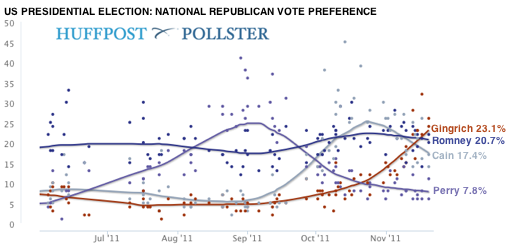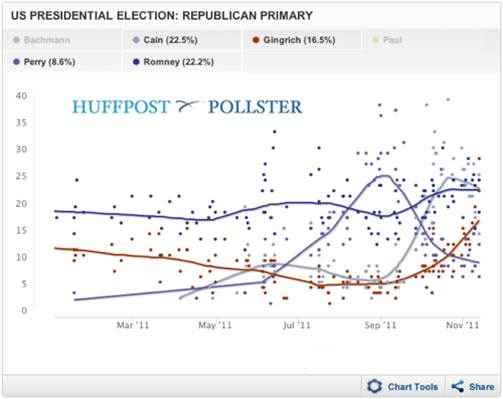J. Ann Selzer, the highly-respected polling director for the Des Moines Register gave a fascinating interview for the Atlantic magazine recently that has implications for the upcoming Iowa caucuses. As regular readers know, perhaps the most significant issue coming out of the most recent Republican debate was Newt Gingrich’s effort to stake out a more moderate position on immigration. Newt’s basic point is that we aren’t simply going to deport all 11 million illegal immigrants, many of whom have been in this nation for decades and have strong community roots. Any effort to reform immigration policy, Newt argues, must begin with this fundamental reality. His Republican rivals, particularly the Mittster, immediately jumped on Newt for advocating “amnesty” for illegals – a characterization the Newtster understandably rejects.
That exchange takes on added significance in light of Selzer’s analysis of Iowan voters’ concerns heading into the Jan. 3 first-in-the-nation Republican caucus. Selzer’s basic point is that those most likely to vote in the Republican caucus are primarily concerned with economic issues, not socially conservative cultural matters. She notes that Mike Huckabee’s surprise victory in the 2008 Iowa caucuses has been widely misinterpreted by media pundits as a sign of religious conservatives’ strength in that state. That’s the crowd both Rick Santorum and Michele Bachmann are playing to this time around, but so far with lackluster polling results. The reason, Selzer points out, is that 2008 was something of an anomaly, in that the fiscal conservatives fragmented the field, while Huckabee was really the only social conservative running. And so he emerged on top. Selzer’s conclusion? “And I think they’ve misread Iowans in thinking that there would be that holdover wish for that kind of candidate. Really, times have changed, things have moved on. So I think you end up with candidates who aren’t resonating because they’re not talking about fiscal ideas to solve the economic problem. They’re focusing on the social ideas they think Iowa caucus-goers would spark to… “
Selzer’s analysis would seem to be good news for Mitt Romney, who is largely running on his private sector job-creating record, and avoiding faith-based and other social issues. And in fact, amid positive polling results that place him second in the state, the evidence suggests that after wavering for several months, Romney has now decided to go all in in Iowa despite his dismal performance there four years ago. In this regard, it is possible that the immigration issue could play to his advantage if he is successful in framing it as an economic concern rather than playing to the nativist sentiment among social conservatives. However, hidden within Selzer’s interview was a fascinating observation that, if accurate, bodes well for the Newtster. Remember my earlier post questioning whether Newt’s “twitter revolution” in campaigning would actually translate into votes in caucus states like Iowa? It turns out, however, that although Santorum and Bachmann have a greater presence in Iowa so far, Newt’s appearances have been more effective. Here’s Selzer again:
“In our Bloomberg poll we had an analysis of how many people had been contacted by each of the campaigns. Ron Paul was first, followed by Michele Bachmann. And the secondary analysis was to say, OK, if you’ve been touched by that campaign, who’s your first choice? So we could kind of look and see the effectiveness of those touches. Santorum goes from 3 percent to 6 percent among people his campaign has touched, and that’s double, but if you’re a small number it’s easy to double it.
Michele Bachmann gets a one-point lift [among voters her campaign has contacted]. It’s not doing her any good. Who gets the lift is Gingrich. His campaign contact number is high 20s, low 30 percent. But he gets 32 percent first-choice votes among people his campaign has contacted. That’s almost double the 17 percent he gets overall in the poll. That number is a very strong number for him. What [voters] have seen of him they liked, and what they have seen of other candidates didn’t impress.”
If Selzer is right, that is evidence that Gingrich’s path to success in Iowa depends on ramping up his reliance on traditional retail, face-to-face contact with potential voters that has been a staple of campaigning in this caucus state in previous elections. The question remains does he have the funding and infrastructure to match Romney, who appears now to be staking much of his campaign on winning Iowa? The problem for Romney, at least in the past, is that he does not get the bounce from these personal contacts that Gingrich seems to based on Selzer’s analysis.
There is an additional complicating factor in Iowa: Ron Paul. He consistently pulls in about 10% of the Iowan vote in polls, but there is evidence that .his extreme libertarian views may put a ceiling on his support. Thus, this Rasmussen poll indicates that Paul, “while placing fourth overall, is also the candidate Iowa voters least want to see win the nomination. Eighteen percent (18%) name Paul as the least favorite candidate followed closely by Bachmann at 15%. Thirteen percent (13%) don’t want to see Romney or Huntsman grab the nomination, while 11% would like to see Cain miss the nod. Newt, on the other hand, is named by only 8% of Iowans polled as the candidate they least want to see to win.” This suggests that Newt may be the second choice of at least some Iowan voters if their favorite falters in the next month.
It is early, of course (at some point this observation will be wrong!), but all signs are that Newt has some hidden strengths in Iowa. To activate these strengths, however, he will need to go beyond his reliance on a social networking-based campaign of ideas, particularly now that Mitt is committing his prodigious resources to building up an infrastructure in Iowa. If he can do so, we may be rewriting the words to that holiday classic come January to begin with:
“He’s a Keen One, Mr. Gingrich”






